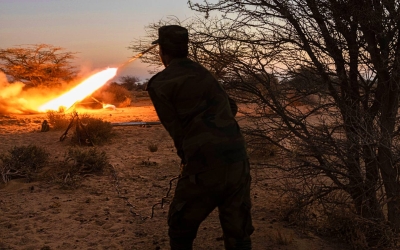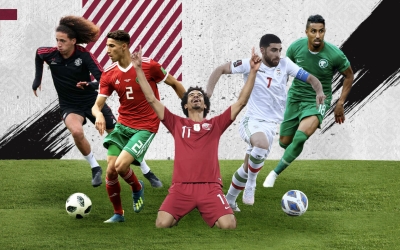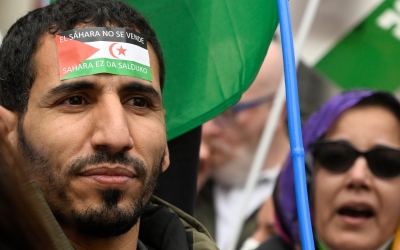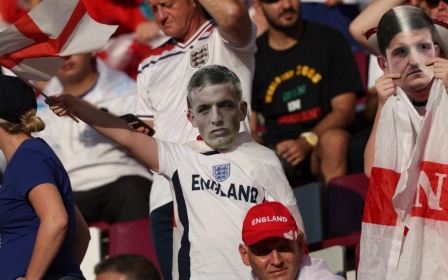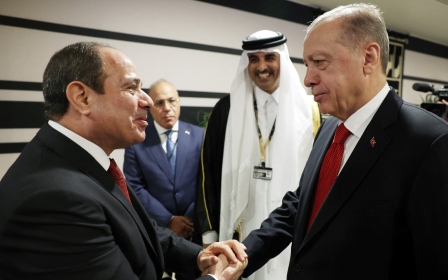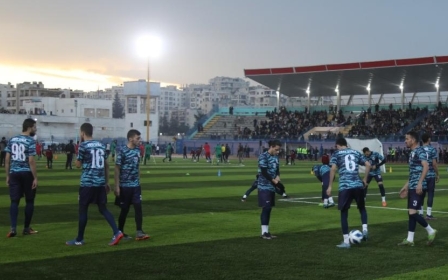World Cup 2022: Morocco finds support in several places but not Western Sahara
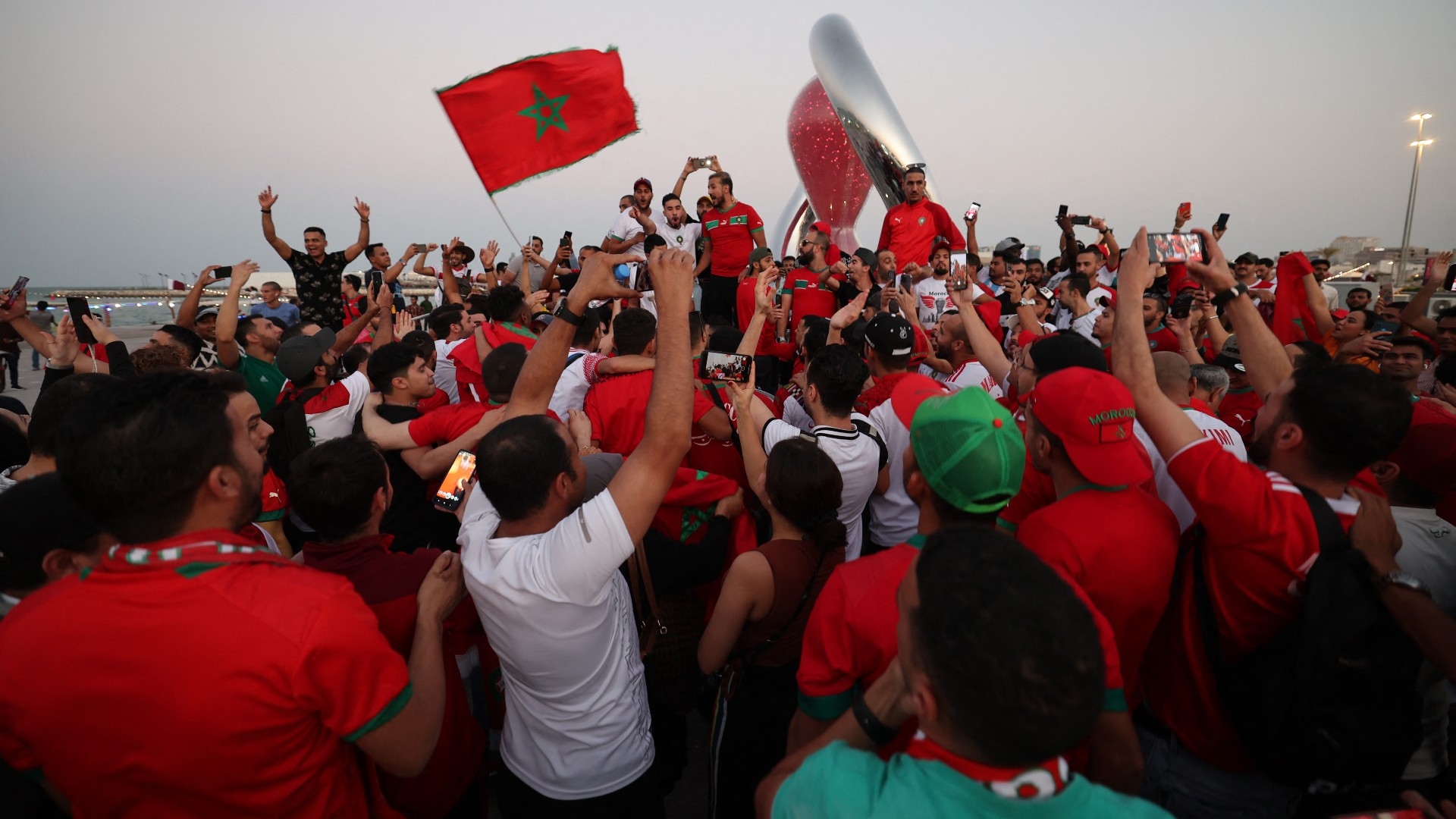
When the Moroccan football team walks onto the pitch at the Qatar World Cup, Madalah Almami says he won't be cheering them on.
He also says he won't be alone in boycotting their games.
As a Sahrawi born and raised at a refugee camp in southwestern Algeria, Almami is among thousands of people who were forced to flee their homes decades ago in Western Sahara - a sprawling swathe of desert on Africa's Atlantic coast that has been disputed by Morocco and independence fighters from the Polisario Front.
Morocco and Mauritania were meant to share Western Sahara when Spain relinquished control, but in 1976 the Polisario Front proclaimed the independence of the Sahrawi Arab Democratic Republic (SADR) - and was determined to fight for it.
Rich in phosphates and adjacent to bountiful Atlantic fishing waters, Morocco now controls around 80 percent of Western Sahara and refers to the entire region as its "southern provinces".
New MEE newsletter: Jerusalem Dispatch
Sign up to get the latest insights and analysis on Israel-Palestine, alongside Turkey Unpacked and other MEE newsletters
At a refugee camp in southwestern Algeria where parents try to break the cycle of pain and poverty that has engulfed this community, there was little to no support for the Moroccan national team that will be aiming to go far at this year's Qatar World Cup.
'Football may be a venue for some to make profit but for me it was a means to express my identity'
- Madalah Almami, refugee
Love for the beautiful game runs deep here and children can be seen playing barefoot in dusty fields where goals are made from large rocks and the football is nearly always flat or running low on air.
It's here - that for many - their love of the sport blossoms.
But it's also here where many grow disillusioned with their favourite pastime as they see their sporting careers stall while those of Moroccan footballers flourish.
'Express my identity'
Almami said he spent most of his youth trying to perfect his skills and become the Sahrawi equivalent of former Moroccan football star Mustapha Hadji.
He recalls his childhood when he would drop his rucksack after a long day of school and spend every moment until sundown chasing after the ball.
"We would play until you could not see the ball anymore," he told Middle East Eye.
As the years went by, Almami joined his camp's local team and was even considered a potential squad player for the Sahrawi national team. But he said passion alone wasn't enough and he failed to break into the side and represent the community he's prepared to die for.
"Football may be a venue for some to make profit but for me it was a means to express my identity," he said.
Ragab Baba Hayay, who coached the Western Sahara team at the 2012 VIVA World Cup in Iraq's Kurdistan region, said there was a lot of pride for the team, despite not many people outside the continent knowing of their footballing exploits.
He said the side he coached back in 2012 played attractive football and performed admirably, despite facing a host of difficulties such as restrictions on the use of their flag during pre-match ceremonies.
The team came in sixth place, suffering 6-0 and 6-2 losses in their first two games. Still Baba Hayay maintains they did well - scoring six goals to gain sixth place at the tournament.
"Regarding the absence of our participation in African events that is because of a lack of a football association, but the [Sahrawi] Ministry of Youth and Sports is working on presenting a file to the African Union," Baba Hayay told MEE.
'Morocco doesn't represent me'
Morocco will be buoyed by their pre-World Cup performances when they take on Croatia at the Al-Bayt stadium on Wednesday.
The Atlas Lions have recorded 14 wins in 20 games in 2022 and look like they could exceed expectations in a group that also includes Belgium and Canada.
With a strong footballing pedigree and thousands in attendance cheering them on, the star-studded team could replicate their stunning performance in '86, where they reached the round of 16.
Still, Gouz Said, another resident at the camp, said he couldn't see himself rooting for the Moroccan national team no matter how far they go.
"The Moroccan team doesn't represent me," he told MEE.
"The Sahrawi Arab Democratic Republic (SADR) is a member of the African Union and it represents me as a country," he said before adding, "looking at Morocco's team they will not make it to the second round. I wish it were Algeria instead because they would have surely made it further," he added.
Algeria narrowly missed out on qualification after being beaten by a strong Cameroon side in March, two months after their impressive 35-match undefeated run ended.
According to Said, Algerian victories and losses were always felt among Sahrawis in the refugee camps, largely due to Algiers' efforts to push back against Moroccan claims of sovereignty over Western Sahara.
Algeria has long hosted and supported the Polisario Front, which seeks full independence in Western Sahara and has demanded a referendum, as provided for in a 1991 ceasefire deal.
Another major base of support for the SADR is the African Union, where it's a member. The region has been recognised as an independent country by 84 UN members, though several countries have begun withdrawing or freezing their recognition in recent years.
If anyone, it's Brazil
During the last two years, tensions have flared in Western Sahara with a return to military confrontation at the 2,700km desert wall that separates Moroccan-controlled Western Sahara and the 20 percent under Polisario control.
At one point last year, the Polisario's armed forces were claiming near-daily attacks on Moroccan military bases and outposts since the ceasefire collapsed.
Tensions had spiked in 2020 when former US President Donald Trump broke with long-held diplomatic norms to recognise Morocco's claim to the territory, as part of a quid-pro-quo for Rabat's normalisation of ties with Israel.
No country has followed the US move, and Germany questioned it at the UN, calling on the US to "act within the framework of international law."
The Biden administration has generally stood by the Trump era decision, while refraining from flat-out recognition of Rabat's claim of sovereignty over the disputed territory.
Living near the desert berm, Ahmed Atanji, a prominent Sahrawi activist and football fan, said the only sides that had support among people in his town were the Sahrawi team and the Algerian national team.
"In Western Sahara, it is forbidden for us to support the Algerian national team," he said. "The Moroccan authorities close cafes and impose a curfew when the Algerians play. Many Sahrawis have been detained when trying to celebrate Algerian victories during the Africa Cup of Nations."
According to Human Rights Watch, Moroccan authorities consider all opposition to their rule in Western Sahara as illegal attacks on Morocco's "territorial integrity," and use this as a basis to ban or disperse peaceful demonstrations and to deny legal recognition to human rights organisations.
For Almami, politics and sport are inseparable and there would be little World Cup cheer unless a neighbouring country that backed their claims for independence took part.
Still, Almami said that as someone who loves football he would be cheering for neutral Brazil, and hoped "they would win the World Cup".
This article is available in French on Middle East Eye French edition.
Middle East Eye delivers independent and unrivalled coverage and analysis of the Middle East, North Africa and beyond. To learn more about republishing this content and the associated fees, please fill out this form. More about MEE can be found here.


